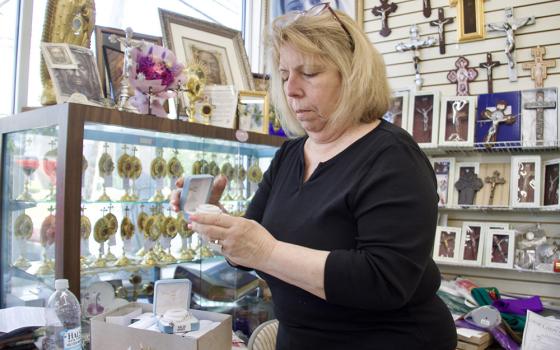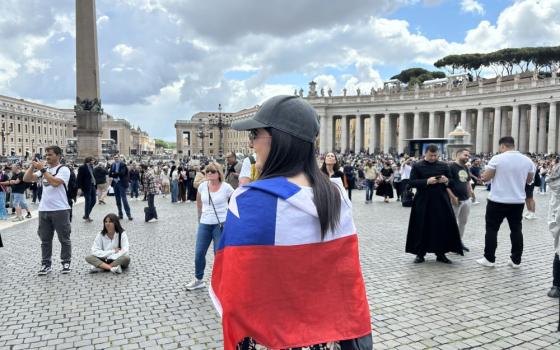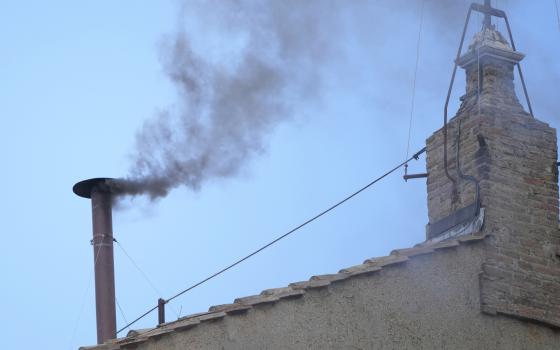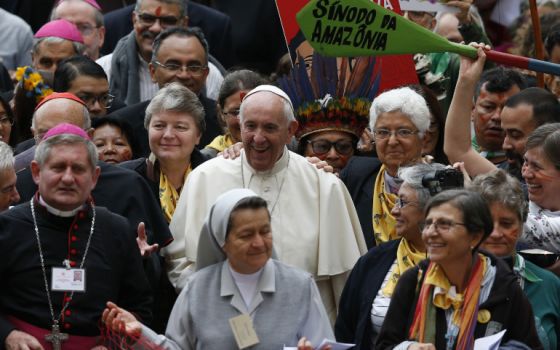
Workers on scaffolding May 2, 2025, attach the stove pipe to the stove that will be used to burn ballots during the conclave to elect a new pope in the Sistine Chapel at the Vatican. Cardinals under the age of 80 will enter the conclave May 7. (CNS/Vatican Media)
The crucial week for the future of the Catholic Church begins today.
In 48 hours, a conclave that promises to be among the most momentous and uncertain in decades is set to begin to decide on Pope Francis' successor.
Time is running out and there are still many cardinals registered to speak at the pre-conclave meetings called general congregations. Efforts are being made to ensure that all cardinals who wish to speak will have the opportunity to address the College of Cardinals, Vatican spokesman Matteo Bruni said today (May 5).
To that end, for the first time ever, Cardinal Dean Giovanni Battista Re has convened two general congregations on the same day: one took place Monday morning, and the other is set to start after lunch.

Cardinal Timothy Dolan of New York speaks with parishioners after he celebrated Mass at Our Lady of Guadalupe Church, his titular church in Rome, May 4, 2025. (CNS/Carol Glatz)
Against the backdrop of the confidential maneuvers, the profile of the 267th pontiff is beginning to emerge. Biographies of the attending cardinals have been distributed in print by Vatican News.
Tomorrow, only a morning congregation is expected to take place.
Preparations and temporary construction work is largely complete in both the Sistine Chapel and Casa Santa Marta, where the cardinals will stay while sequestered to elect the pope. Cardinal electors who wish to switch rooms to their assigned accommodations will be allowed to do so.
Journalists are prohibited from visiting the Sistine Chapel, which has already been secured by the Vatican Gendarmerie.
Cardinal electors will be required to leave their cell phones at Santa Marta, as there will be no WiFi, Internet or communications connections available either there or in the Sistine Chapel,
During Sunday Masses of the cardinals in Roman parishes, Cardinal Timothy Dolan of New York met the press and Roman parishioners with his usual mix of easy jokes and theatrics, while embarrassment over President Donald Trump's photo dressed as the pope — circulated by White House social media channels — has become an issue in Rome.
"It was not a good thing," Dolan said when asked if he found the image offensive — which is how the New York State bishops' conference described the computer-generated image.
Asked about Trump's odd "endorsement" of his candidacy, Dolan reacted with a frown and a hand gesture to dismiss the subject.
And when asked if it would be appropriate for the president to apologize for the fake image, Dolan said, "Who knows?"
Advertisement
Trump's political ally across the Atlantic, Italian Prime Minister Giorgia Meloni, has intimated members of parliament from her political party, the far-right Brothers of Italy, to refrain from any public statements about the future pope. Meloni said any comment about Trump as pope was "inappropriate" and "meaningless," said the Italian newspaper La Repubblica.
The message is clear: at such a delicate moment, the only posture allowed is that of a spectator, out of respect for the "doctrine of faith." In reality, this is to avoid any diplomatic implication that could embarrass the Italian government, a source close to the Italian government told La Repubblica.
Going back to the pre-conclave meetings among cardinals, the Italian daily il Fatto Quotidiano said that yesterday that Honduras Cardinal Óscar Rodríguez Maradiaga, has already left Rome with a sense of bitterness and disillusionment, 12 years after he contributed decisively to the election of Pope Francis.
The newspaper reported that at the general congregations he witnessed the unraveling of the pro-Francis alliance, with many former supporters of the pontiff now becoming, in his words, "turncoats."
No longer an elector, Maradiaga took the return flight to Honduras, symbolically marking the end of an era and leaving behind a conclave where stabs at Bergoglio's pontificate come from those who were chosen by him, the news outlet said.
Among Latin American cardinals some enthusiasm for Italian "papabile" Cardinal Pietro Parolin seems to be growing. In a post on X, 80-year-old Venezuelan cardinal Baltazar Enrique Porras Cardozo wove an affectionate and strategic eulogy to Parolin, recalling his key role as former apostolic nuncio to Venezuela and as current Vatican secretary of state.
In another post on X, Cardinal elector Fernando Chomali, archbishop of Santiago, Chile, expressed a sense of hope and determination for the future of the church, noting with satisfaction the commitment that is being manifested in the pre-conclave meetings. "I love the Church," he said.
Meanwhile, even U.S. Cardinal Robert Prevost is emerging as a prominent papabile figure in the post-Francis era, embodying a unique blend of American organizational efficiency and Latin American pastoral sensitivity, reported Religión Digital today, a global religion news portal which describes itself as "the world's leading Spanish-language religious information portal in the world."
Prevost's background, which spans 18 years in Peru, equips him with the ability to bridge the North-South divide that Francis sought to address, Religión Digital said. Known for his pragmatic reformism, Prevost has gained recognition for promoting episcopal appointments that align with Francis' teachings on synodality, mercy and a preferential option for the poor.
The Italian newspaper il Fatto Quotidiano wrote today that "a sudden upsurge in the odds for Robert Francis Prevost is to be recorded."

Cardinal Fernando Filoni, grand master of the Equestrian Order of the Holy Sepulchre of Jerusalem, speaks with the press as he approaches the Petriano entrance of the Vatican next to St. Peter's Square to attend a general congregation meeting in the New Synod Hall at the Vatican April 24, 2025. (CNS/Lola Gomez)
Italian Cardinal Fernando Filoni, who is considered to be a papabile by many Italian news outlets, conceded an on-the-record interview with Italian newspaper Il Corriere delal Sera. Reflecting on his 2013 conclave experience, he said that "in that moment you perceive the mystery of Grace, the sacredness of conscience, the dimension of faith that tells you: this is an act you perform before God."
"We can do all our calculations, this [cardinal can get] twenty [votes], that other [cardinal can get] forty [votes]. I can say I voted for one and actually I voted for another. Who sees me? My conscience knows."
The same newspaper today has a celebratory story about papabile Italian Cardinal Matteo Zuppi's poor, humble lifestyle surrounded by the elderly priests and suffering citizens of the city where he is archbishop, the left-leaning Bologna.
Zuppi resides in the Casa del Clero, a retirement home for elderly priests, where he is affectionately regarded as one of the family. Known for his deep connection to his fellow priests, he is admired for his dedication, often waking early to cycle and returning late after fulfilling his pastoral duties.
The priests at the Casa expressed their hope that Zuppi, one of the top contenders for the papacy, could become "Papa Matteo," namely the first pope ever to choose the name Matthew.
NCR Vatican correspondent Christopher White contributed to this story.







